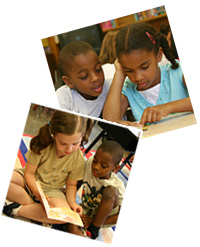PALS: A Reading Strategy for Grades K–1 (Archived)
Wrap Up
 A research-validated approach for increasing students’ reading performance, PALS revolves around reciprocal peer tutoring, allowing students the opportunity to practice reading and to receive immediate corrective feedback. Though some teachers may doubt the ability of kindergarten and first-grade students to successfully implement the approach, PALS developers Lynn and Doug Fuchs point out that, “One should not underestimate the capacity of young children, including those as young as 5 and 6 years, to work productively, constructively, and supportively with each other to enhance their own learning” (Fuchs and Fuchs, 2005).
A research-validated approach for increasing students’ reading performance, PALS revolves around reciprocal peer tutoring, allowing students the opportunity to practice reading and to receive immediate corrective feedback. Though some teachers may doubt the ability of kindergarten and first-grade students to successfully implement the approach, PALS developers Lynn and Doug Fuchs point out that, “One should not underestimate the capacity of young children, including those as young as 5 and 6 years, to work productively, constructively, and supportively with each other to enhance their own learning” (Fuchs and Fuchs, 2005).
Mrs. Doris and Ms. Chandler decide that PALS would be a great instructional practice to supplement the core reading program for the kindergarten and first-grade students at Washington Elementary. They base their decision on their findings in the table below.
Benefits of PALS
- Addresses the reading standards for kindergarten and first grade
- Accommodates the individual learning needs of diverse students (low-, average-, and high-achieving students; students with learning disabilities; English learners)
- Engages students
- Is easily implemented
- Is cost-effective
- Accelerates student reading achievement
- Allows students more opportunities to practice reading skills
In addition to the many benefits listed above, teachers report that students actually enjoy PALS. Stephanie Johnson witnessed this enthusiasm with her kindergarten students (time: 0:41).

Stephanie Johnson
Kindergarten teacher, Westwood Elementary School
Bloomington, Minnesota
Transcript: Stephanie Johnson
I am a kindergarten teacher who still has the housekeeping center set up. And this year my girls asked that it be changed to a teacher center. I very willingly changed the housekeeping center, and I was amazed at the amount of girls and boys who went over there. Their teacher center consisted mostly of K-PALS materials. I used one of the K-PALS binders that we weren’t using this year. And during choice time, boys and girls were taking turns with my K-PALS manual being the teacher. They knew exactly how to do that. I could only get about four or five kids in that teacher center, but there was a waiting list to get over there.
Revisiting Initial Thoughts
Think back to your responses to the Initial Thoughts questions at the beginning of this module. After working through the Perspectives & Resources, do you still agree with those responses? If not, what aspects about them would you change?
What characteristics might the teachers at Washington Elementary look for in a reading approach?
What types of activities can the teachers at Washington Elementary use to increase their students’ reading skills?
How can the teachers at Washington Elementary implement these activities?
When you are ready, proceed to the Assessment section.